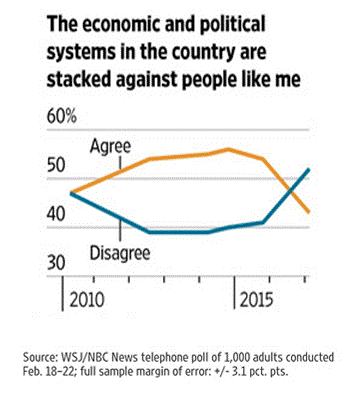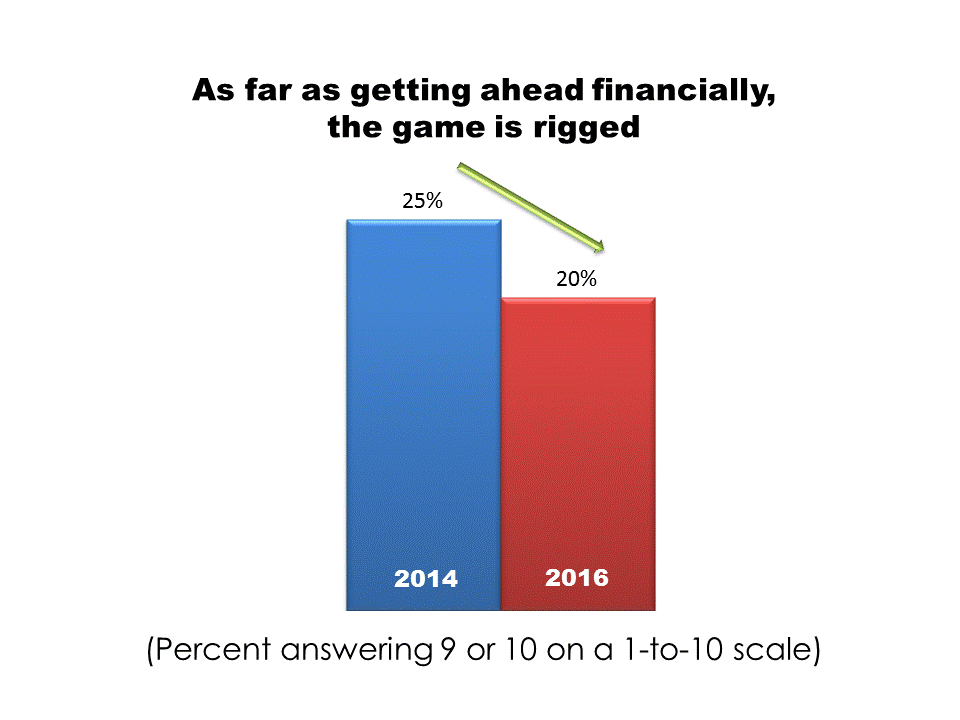National attitudes changed massively from 2014 to 2016
Many of the responses to our last blog (“How Has the Mood of the Country Changed in the Past Two Years?”), included comments like “a cheery mood is not what I’m hearing,” and “please run your national survey again.”
Fair enough. We will indeed run the survey again this year.
But our major point was not about outcomes; it was about a large-scale tendency to avoid a simple, dispassionate reading of social science data. If you can do that, you can clearly see that the warning signs were there, and abundant. Our industry (market research) simply chose not to read the data as they naturally fell.
There’s a marvelous mea culpa from Katja Cahoon of Beacon Insight Group that really should be read by all. Very rarely do market researchers own up to how they are interpreting data; cognitive dissonance is hardly mentioned at all. But Katja’s confession is remarkable. (A snippet appears below.)
Magic happens when you interpret data dispassionately
Let us give you a quick example of the magic that happens when you read social science data dispassionately. Trends start to move in the same direction, and there is cross-validation of findings from disparate sources. (Imagine that!)
An NBC News/WSJ tracking poll asked respondents whether they agreed with the statement “the economic and political systems in the country are stacked against people like me.” The degree of agreement with this statement declined significantly from 2014 to 2016 (see below).
What our research on the mood of the country found
We saw the same trend in our tracking research. We asked respondents how strongly they agreed with the statement “As far as getting ahead financially, the game is rigged.” Like the NBC News/WSJ poll, we found that overall agreement with this statement declined from 2014 to 2016 (see below).
(Our poll uses a 10-scale and the NBC News graphic removes the “I’m not sure” responses, but the trend is in the same direction.)
The identification of this trend does not mean, of course, that there was no mood of disgruntlement in the nation at all; it simply means that there was a building undercurrent of expectation that things would somehow improve in the near future.
The Washington Examiner went into a little more depth on the trend, saying:
“The pollsters asked, “During the next twelve months, do you think that the nation’s economy will get better, get worse, or stay about the same?” Forty-one percent said they expect the economy to get better, versus just 21 percent who expect it to get worse and 36 percent who expect the economy to stay the same. That 41 percent, plus 42 percent who expected better times in the Journal’s poll last month, are the highest expectation numbers in the Journal’s polling since October 2012, right before Barack Obama was re-elected.”
(The Washington Examiner, February 26, 2017)
Many other fair-minded researchers saw the trend
Our firm is not unique in seeing a trend like this. Actually, quite a number of pollsters and market researchers saw it. It’s just that media reporting on their findings was light, so the reading/viewing public never really knew.
Our view
We will certainly keep an eye on this trend, especially for any notable departure from it. But it’s almost undeniable that a roughly optimistic trend is there. In our next post we will look at even more attitudes that changed from 2014 to 2016.
We still cling to the notion that, while the political barbs are flying back and forth, it’s possible for sober analysts and social science researchers to read the data honestly. But at the same time it seems that when researchers interpret the data dispassionately, there’s no scribbling reporter nearby ready to present their story to the world. There seems to be more media appetite for piling onto an existing narrative, regardless of what the data say.
It’s pretty much as Titus Bond of the research firm The Remington Research Group put it: “A lot of pollsters, they want to be at the same number as everyone else.”
Tell us what you think
What’s your view? If you’d like to comment on this topic, please click on “Add Comments” below. We’d love to hear from you!

Tell us how we can help you
Cascade Strategies can serve your market research needs from the most straightforward to the most sophisticated project. Don’t hesitate to contact us to tell us about your next project, or your overall research needs in general. You can call (425) 677-7430 and ask for Jerry, Nestor, or Ernie. Or send us an email at info@cascadestrategies.com. We’ll get back to you quickly!
subscribe




-

-

Add comments